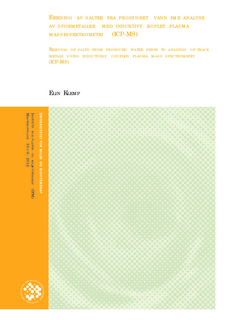| dc.description.abstract | En metode for fjerning av salter fra sjøvann før analyse av spormetaller med Induktivt koblet plasma
massespektrometri (ICP-MS) er undersøkt med hensyn på deteksjons- og kvantifiseringsgrenser,
presisjon, gjenfinning, nøyaktighet, spesifisitet og robusthet. Det ble benyttet seaFAST™ rense- og
oppkonsentreringskolonner fra PerkinElmer® for å oppkonsentrere spormetallene og samtidig fjerne
den saltholdige matriksen som kan føre til gjentetting av instrumentets ioneoptikk og koner i
”interface”, og dannelse av polyatomære isobare interferenser.
seaFAST™ rense- og oppkonsentreringskolonner ble testet ut med hensyn på optimal pH og kapasitet
for binding av metallene kadmium (Cd), krom (Cr), kobber (Cu), nikkel (Ni), bly (Pb) og sink (Zn) i
prøver som inneholder salter.
Resultatene viste at kolonnene egner seg bra for oppkonsentrering av Cd, Cu, Pb og Zn ved pH 4,9,
med 99 – 100 % lading og 79 – 108 % eluering av kjent mengde metaller i syntetisk sjøvann, samtidig
som salter i prøvene fjernes.
Det ble hentet to ulike typer sjøvann for validering av metoden; sjøvann fra 80 meters dyp i Mekjarvik
og sjøvann fra Tananger havn; begge i Rogaland fylke.
Målemetoden som ble utviklet på ICP-MS ga ikke tilfredsstillende deteksjons- og
kvantifiseringsgrenser, presisjon, gjenfinning eller nøyaktighet for metallene av interesse i denne
oppgaven. På grunn av oppkonsentrering og direkte analyse uten fortynning var det ønskelig å oppnå
kvantifiseringsgrenser som var minst ti ganger lavere enn for analysering av sjøvann med 1:10
fortynning.
Den største usikkerheten i metoden lå i prøvepreparering og rensing og oppkonsentrering med
seaFAST™ kolonnene. Mye manuell håndtering av prøvebeholdere og problemer med gjentetting av
pumpeslanger i oppkonsentreringsprosessen var store bidragsytere til usikkerheten. Lave
konsentrasjoner av metaller i naturlig sjøvann gjorde at kontaminering kunne gi store utslag i
resultatene. A method for the removal of saltes prior to analysis of trace-metals with Inductively coupled plasma
mass spectrometry (ICP-MS) was examined for limit of detection (LOD), limit of quantification
(LOQ), accuracy, retrieval, precision, specificity and robustness. seaFAST™ clean-up and preconcentration colums from PerkinElmer® were used to concentrate the trace metals and
simultaneously remove the salt-containing matrix that may cause clogging of the ion lenses and cones
in the interface, and the formation of polyatomic interferences.
The pH optimum and capacity of the seaFAST™ clean-up and pre-concentration columns was tested
for binding of cadmium (Cd), crum (Cr), cupper (Cu), lead (Pb), nickel (Ni) and zinc (Zn) in samples
containing saltes.
The results showed that the colums can be used for pre-concentration of Cd, Cu, Pb and Zn in solution
of synthetic seawater of pH 4,9. At this pH, the loading of the metals onto the column was 99 – 100 %,
and the elution was between 79 and 108 %. At the same time the saltes are separated from the
analytes.
For the validation of the method, two different types of seawater was collected; seawater from 80 m
depth in Mekjarvik and seawater fro Tananger harbor; both in Rogaland county.
The limits of detection, limits of quantification, recoveries, precision and accuracy of the
method were insufficient and unsatisfactory for the metals of interest. Because of the direct
analysis of the samples and the use of a pre-concentration column it was desirable to achieve
LOQs that were at least ten times lower than the LOQs from analysis of samples with 1:10
dilution.
The biggest uncertainty was in preparation of the solutions and use of the seaFAST™ clean-up and
pre-concentration columns. Manual sample preparation and problems with clogging of the tubes in the
pre-concentration process were major contributors to the uncertainty. Low concentrations of metals in
natural seawater meant that contamination could have major effects on the results. | no_NO |
